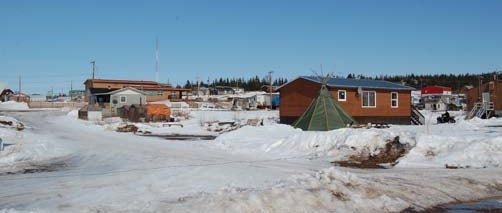
- Project background
- Component 1: Thelon Stories
- Component 2: Visitor Behaviour
- Next steps
- Movie night
- School presentation
- Hide tanning
- Acknowledgements
This report highlights activities associated with a Thelon River research project and carried out in Lutsel K’e during April, May, and June 2014. These activities are part of a two-year project called Picturing the Thelon River: Restor(y)ing Denesoline Relations en Route to the Headwaters, which was designed by the Lutsel K’e Wildlife, Lands, and Environment Committee (WLEC) and researchers at the University of Waterloo and Carleton University. Two Waterloo graduate students, Lauren King and Ally Holmes, and the Lutsel K’e Research Coordinator,Terri Enzoe, coordinated the activities. The participatory nature of the project allowed for several Lutsel K’e residents and representatives to assist with the research in different ways.
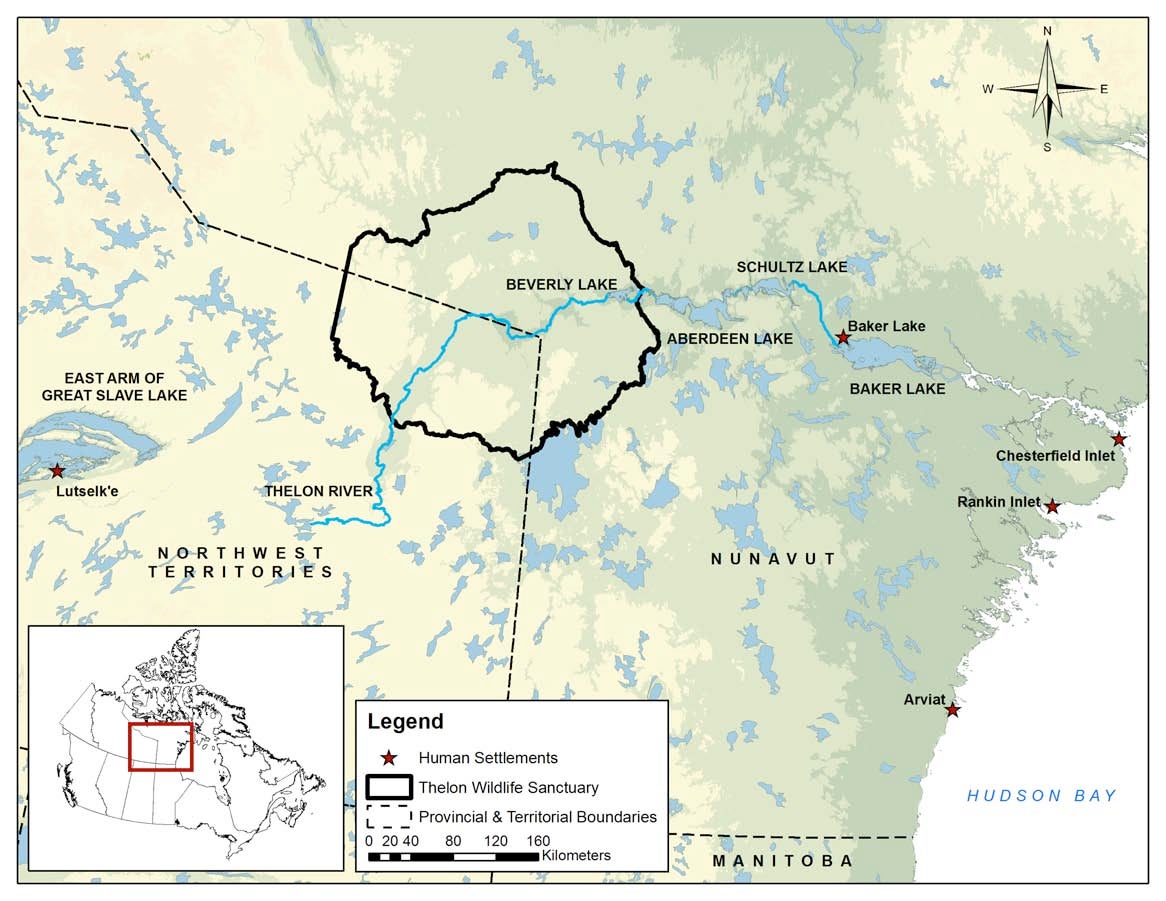
Figure 1: The Thelon River Watershed
Project background
enhanced understanding of, and responsible relationships to, a sacred place within the context of social-ecological change. It is a community-based and participatory project emphasizing collaborative research relationships between northern Aboriginal communities, river tourists, and university researchers.
Between 2008 and 2011, research was carried out with Inuit residents of Baker Lake, Nunavut, and Thelon River canoe tourists. The current project with Lutsel K’e evolved from meetings in November 2012 and December 2013 involving the WLEC and University of Waterloo researchers.
The purpose of the research is to work with the community of Lutsel K’e in responding to contexts of Arctic change by revealing and restoring Denesoline relationships with the Thelon River watershed.
The project is based on three objectives:
- To foster and celebrate Denesoline cultural livelihoods by recording, experiencing, and exchanging local and traditional knowledge associated with the Thelon River watershed;
- To synthesize, analyze, and interpret Thelon River watershed policies, archives, and media productions for meaningful use within the community context of Lutsel K’e;
- To plan and pilot a knowledge exchange land camp that will: a) involve collaborations between Dene, Inuit, university researchers, and other Thelon stakeholders; and b) become the basis for future collaborative research.
In June 2014, a research agreement between the Lutsel K'e Dene First Nation (LKDFN) and the University of Waterloo was formalized to define the terms and conditions of the collaborative research. The agreement also describes the interview, workshop, and land camp research methods that make up the project.
Research carried out in spring 2014 focused on the first project objective noted above. In particular, two research components involving interviews and workshops with Lutsel K’e residents were prioritized. These activities are described in detail below.
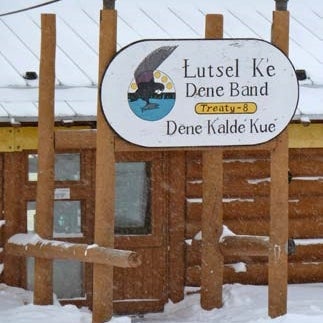
Lutsel K'e Band Office
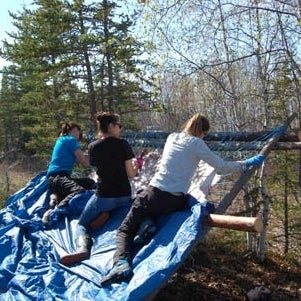
Hide Tanning Camp

Summer image of Thelon
Component 1: Thelon Stories
Researchers – Lauren King and Terri Enzoe
'Life-story' interviews were carried out with 25 Lutsel K’e community members, including Elders, land users, and youth. For this style of interview, the people interviewed were invited to decide what stories to share and tell based on their direct experience with the Thelon River or based on knowledge passed down to them by their ancestors. Interviews began with general conversations about participants’ relationships with, and stories about, the Thelon. More specific attention was also given to the stories that:
- participants want future generations to know about;
- highlight social and ecological changes within the Thelon watershed;
- were deemed important for Denesoline youth to know; demonstrate Denesoline occupancy and involvement in governance and management of the Thelon;
- and involve interactions with other groups, including Inuit.
All interviews were audio-recorded and transcribed, and these materials are now stored in the Lutsel K’e community archive for future community access and use.
Overall, the interviews revealed how Denesoline knowledge, use, and connection associated with the Thelon are sensitive and adapting to various historical and contemporary changes. The following excerpts are examples of the kinds of stories told during interviews:
- Florence Catholique described circumstances associated with the development of the Thelon Wildlife Sanctuary Management Plan: “Lutsel K’e took the position that nothing can happen in the Thelon without our involvement. So we sort of imposed ourselves on the government [of Northwest Territories] and said we want to go through a process with the Baker Lake people. And we had a big gathering [in the Sanctuary] and we talked about the management plan and how we could work together. The agreement to work together is there. The ideology of how, why, and who is all the same. The only factor that’s not there is…the money. In their piece [Baker Lake Inuit] they have the money; it’s not an issue. In this case, it’s the Territories government. So that management plan is sitting there.” (May 07, 2014)
-
Damien Kailek recalled his experience on the 2011 NatureConservancy canoe trip down the Thelon River: “Best two weeks ofmy life. You know the best part of it was just being on the river andpaddling down, and seeing everything. You know, it really gave me a good understanding of what we have out there. And it’s definitelyworth fighting for, worth keeping, and just being untouched, youknow. Just leaving it the way it is.” (April 29, 2014)
After all interviews were carried out, Lauren and Terri facilitated a community workshop with Elders, land users, and youth. The workshop occurred on June 16, 2014 at the Healing Centre’s tent. The workshop’s purpose was to collaborate with community representatives to begin interpreting the stories told during interviews and to share new stories that shed light on past and current relationships with the Thelon. Several points were emphasized in the workshop, including:
- The types and number of animals are changing;
- Elders have warned of major changes within the Thelon basin, including flooding;
- Animals have spirits and Dene have the ability to communicate with them;
- Mines are affecting the health of caribou and people, as well as water quality;
- The land has the power to heal people and make them stronger;
- The land and water needs protection;
- Lutsel K’e must continue to work with Baker Lake Inuit to protect the Thelon.
In addition to contributing to the Lutsel K’e community archives, the Thelon stories documented in this research component are to be used in community celebrations and presentations at the school and community hall. The stories will also be incorporated into an upcoming land camp at Whitefish Lake (March/April 2015) as a means for exchanging knowledge between generations (e.g., Elders/land users and youth) and cultures (e.g., Dene and University of Waterloo researchers). They will also serve as basis from which to plan for future land camps and research involving Dene and Inuit.

Looking West
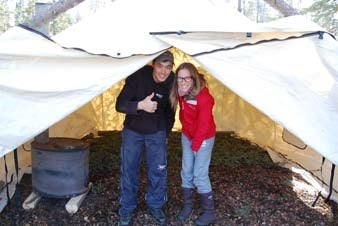
Damien Kailek and student researcher, Lauren King
Component 2: Visitor Behaviour
Twelve individuals participated in interviews that focused on ‘life stories’ relating to experiences with visitors to the Thelon River watershed and other traditional Denesoline lands. Because the focus of these interviews related to LKDFN involvement in managing the Thelon River watershed, participants involved in this aspect of the study included past and present members of the WLEC, members of Ni Hat’ni Dene, as well as land users, Elders, and youth. Each participant was invited to tell stories about positive and negative encounters with, and impacts of, visitors. Similar to the Thelon Stories component, audio-recorded and transcribed interviews are now stored in the Lutsel K’e community archive for future community access and use. They will also be used in future research activities, including the headwaters land camp, community presentations, and academic publications.
Overall, participants’ stories of visitor behaviour emphasized the importance of protecting and respecting the land. Different categories of visitors were identified, including Aboriginal hunters from outside of Lutsel K’e, boaters and canoeists, and government and mining officials. Participants described specific examples of appropriate visitor behaviour while travelling and/or using LKDFN traditional lands, and discussed the information/knowledge people required prior to travelling on the land or visiting the community.
The following excerpts are meant to provide a sample of the kinds of stories told during the interviews:
- Joseph Catholique emphasized the importance of respect, safety, and learning from community members, stating that visitors should “stop on by and say where you’re going and how you’re going” before travelling on the land. Joseph described his experience on the land and the Thelon River, and expressed a willingness to share his knowledge of respectful and safe behaviour with visitors because “if you don’t know what you’re doing...if you don’t have enough of respect for the river.... it’ll just give you a big blowing snow.” (April 28, 2014)
- Gloria Enzoe described the LKDFN territory is a beautiful place for “guests to get away from everyday city life”. Nevertheless, it is important that visitors realize they’re “coming to somebody else’s home and that regardless of where you go within our traditional territory, it’s our home....and we want the land respected and we want the animals respected and the water respected.” (May 08, 2014)
- As another participant described: “The Thelon is a sacred place, and I would prefer it if Lutsel K’e and Baker Lake were the gateways to the Thelon so that we can make sure [visitors] have our advice going forward. And it’s not to say that we want to limit anyone’s access or experience, but I think it’s to enhance it and to make it more safe… [and] so that they’re contributing some money to our economy.” (May 14, 2014)
interviews. Stories and themes from the interviews were shared with the committee to allow further discussion and elaboration. For example, workshop participants shared their perspectives on respecting the land, why this is so important, and how it is accomplished (e.g., by paying the land, being silent in certain areas, respecting animals and archaeological artefacts). Participants also considered the extent to which visitors are welcome to Lutsel K’e and on Denesoline lands, the potential economic contribution that tourism might have on the community, and the idea that people who visit and experience the land can help protect it by raising awareness within their home communities. Issues such as visitor monitoring, visitor safety, and enhancing opportunities for local guides were also discussed.
From the information provided during the interviews and WLEC workshop, a next step is to generate a code of conduct for visitors to Lutsel K’e and LKDFN lands. This will highlight community expectations of visitor behaviour by synthesizing the stories told by interview and workshop participants. Consistent input from the LKDFN representatives will be an important part of drafting this code of conduct so as to ensure community voices, perspectives, and participation remain at the centre of this study component.
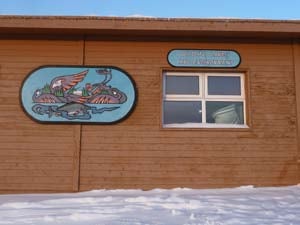
WLEC Office
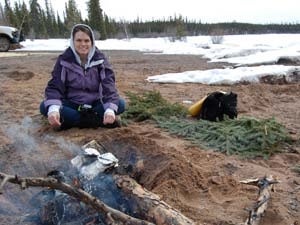
Student researcher, Ally Holmes
Next steps

Over the next several months, the research team will be working with the WLEC to plan a land camp at Whitefish Lake. The land camp will occur in late March or early April 2015, and involve a small group of land users and youth from Lutsel K’e and two members of the research team. The land camp will focus on celebrating, experiencing, and teaching about Denesoline traditional knowledge. Participants will also explore ways that future land camps can support LKDFN involvement in co-managing the Thelon with Inuit.
With input and feedback from LKDFN representatives, the research team is also working to synthesize the stories documented during spring research. Anticipated outcomes of this process will include: academic conference presentations and publications reviewed and possibly co-authored by LKDFN representatives; a community event that celebrates the knowledge and research contributions of Lutsel K’e residents; resources designed to support school curriculum (e.g., a children’s book about the Thelon); and information materials and resources developed for circulation within and beyond Lutsel K’e (e.g., a code of conduct for visitors to Denesoline lands).
Movie night
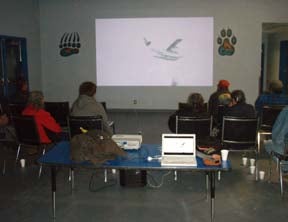
On May 20 at the Lutsel K’e arena, the research team organized a screening of the film The Spirit of the Thelon for an audience of approximately 30 people. Starring in the movie are: Noel Drybone, Marlene Michelle, Aileen Drybone, Joseph Catholique, and two Inuit from Baker Lake, Roy Avaala and Jason Putirmiraqtuq. The film traces this group's journey by canoe from Lutsel K'e to Baker Lake in 1999. A copy of the film was left for community use and access at the WLEC office.
School presentation
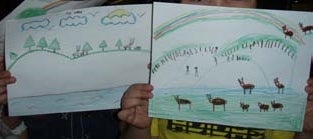
The research team organized two school presentations, one on May 20 and one on May 21. Students were engaged in listening to stories told by Herman Catholique about the Thelon and caribou migration. They also heard from Damien Kailek about his participation in the 2011 Nature Conservancy canoe trip along the Thelon. After hearing these stories, several students drew pictures of what they believe the Thelon looks like and identified with the reasons why protecting the Thelon is important to the LKDFN.
Hide tanning
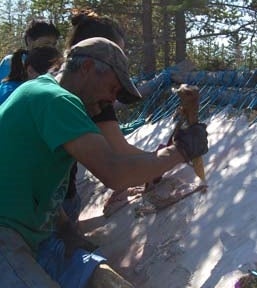
During her stay in Lutsel K’e, PhD student Lauren King was invited to participate in the moose hide tanning culture camp that took place at Gap (river) between Stark Lake and Great Slave Lake from June 6 to 15. Under the guidance of Elders, adults, and youth, Lauren learned how to flesh, scrap, and stretch moose, caribou, and muskrat hides. It was a memorable, hands-on learning experience of a traditional Dene craft. Thank you!!
Acknowledgements

Thank you to all those contributing knowledge, stories and expertise to this project!
Research Component 1: Thelon Stories
Interview participants:
Joe Lockhart
Herman Catholique
Eddy Drybone
Joe V. Catholique
Madeline Catholique
Dillon Enzoe
James Lockhart
Morning Star Silas
Damien Kailek
Joseph Catholique
August Enzoe
Fred Marlowe
Pierre Marlowe
Ron Fatt
JB Rabesca
Shonto Catholique
Madeline Drybone
Florence Catholique
Eddie Catholique
Ernest Boucher
Terri Enzoe
Alfred Lockhart
Madeline Marlowe
Community workshop participants:
Kyle Enzoe
Irene Catholique
Dillon Enzoe
Terri Enzoe
Joseph Catholique
Sweetgrass Casaway
Morning Star Silas
Eddie Drybone
Jasmine Catholique
Research Component 2: Visitor Behaviour
Interview participants:
Joseph Catholique
Jerry Lockhart
Damien Kailek
Brandon Michel
Terri Enzoe
Herman Catholique
Gloria Enzoe
Pete Enzoe
Steve Ellis
Sweetgrass Casaway
Two participants wish to remain anonymous
WLEC workshop participants:
Terri Enzoe
Sam Boucher
Joseph Catholique
Mike Tollis
Ron Fatt
For making this research possible, a special thanks to:
- LKDFN Wildlife Lands and Environment Committee
- Terri Enzoe, Lutsel K'e Research Coordinator
- Mike Tollis, LKDFN Wildlife Manager
- Lutsel K'e Band Council
- Agatha Laboucan, LKDFN Band Manager
- Brian Green, Lutsel K'e Coop
- Steve Ellis and Stephanie Poole
Thank you also to those involved in the movie night and school presentations, and that invited Lauren to participate at the hide tanning culture camp. We are grateful to Social Sciences and Humanities Research Council of Canada for funding this research. Photos used in this report by Bryan Grimwood, Lauren King, or Ally Holmes.
Questions or comments about this report?
Bryan Grimwood
Department of Recreation and Leisure Studies
University of Waterloo
200 University Avenue, Waterloo, ON N2L 3G1
bgrimwood@uwaterloo.ca
Phone: (519) 888-4567 ext. 32612
Report prepared by Bryan Grimwood, Lauren King, Allison Holmes, and Gita Ljubicic, September 2014